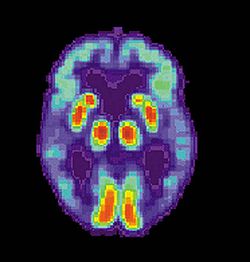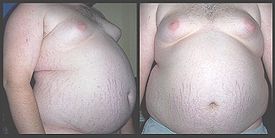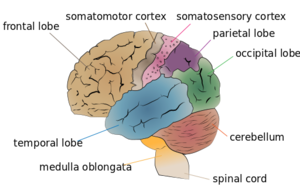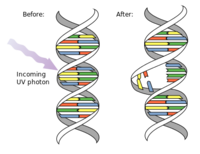
Alzheimer's disease is "characterised by loss of neurons and synapses in the cerebral cortex and certain subcortical regions. This loss results in gross atrophy of the affected regions, including degeneration in the temporal lobe and parietal lobe, and parts of the frontal cortex and cingulate gyrus.[1] Some of the primary symptoms of Alzheimer's disease are: memory problems, mood swings, emotional outbursts, brain stem damage which impairs function in the heart, lungs plus causes disruption of various other bodily processes.[2]
The current global atheist population mostly resides in East Asia (particularly China) and in secular Europe/Australia primarily among whites.[3] See: Global atheism
In irreligious/nonreligious regions, there is a significant amount of Alzheimer's disease (see: Irreligious/nonreligious geographic regions and Alzheimer's disease).
Atheism, sub-replacement birth levels, aging populations and Alzheimer's disease
Alzheimer's disease is more common among the elderly and in terms of global atheism and aging populations, global atheism is facing significant challenges in terms of aging populations in East Asia and Europe and atheism is expected to shrink in terms of its market share of the world's population (see: Desecularization).
One of the primary reasons why irreligious regions are facing significant rates of Alzeimer's disease per capita is due to the sub-replacement levels of births of irreligious regions (see: Atheism and fertility rates) which results in disproportionally large elderly populations.
Atheism, obese populations and Alzheimer's disease

See also: Atheism and obesity and Atheism, obese populations and Alzheimers' disease
Obesity/diet are linked to the development of Alzheimer's disease.[5][6]
Secular Europe and communist China have significant problems with obesity (see: Secular Europe and obesity and China and obesity). In addition, Australia has a significant problem with obesity (see: Australia, irreligion and obesity). In the United States at the present time, the greater the degree of irreligiosity in a generation, the higher their obesity rate is. According to the Gallup Inc., "Very religious Americans are more likely to practice healthy behaviors than those who are moderately religious or nonreligious."[7] For more information, please see Atheism and obesity.
Irreligion, sedentary behavior and Alzheimer's disease
See also: Atheism and sedentary lifestyles

In 2017, Medical News Today reported that "For older adults, a lack of exercise may put their risk of developing dementia on par with that of adults who are genetically predisposed to the disease. This is the conclusion of a new study published in the Journal of Alzheimer's Disease."[9]
The journal article Spirituality and Physical Activity and Sedentary Behavior among Latino Men and Women in Massachusetts which was published in the journal Ethnicity and Disease declared: "There is a significant negative relationship between spirituality and sedentary behavior."[10]
In addition, numerous studies report that athletes to be more religious than non-athletes.[11] See also: Sports performance: Religious faith vs. atheism
A Netherland study of 120,000 men/women found that men who average 90 minutes exercising a day, had nearly a 40 percent higher chance of living to 90 than those who spent 30 minutes or less on exercise a day. In addition, every additional 30 minutes spent exercising a day increased the men's chances of living to 90 by five percent.[12] Religion/spirituality is positively correlated to greater longevity (see: Atheism and life expectancy).
Irreligion/nonreligious regions of the world and sedentary lifestyles
Irreligion/nonreligious regions have populations with significant problems when it comes to engaging in sedentary behavior (see: Irreligion/nonreligious regions and sedentary behavior).
See also:
Atheism, alcoholism, and Alzheimer's disease
See also: Atheism, alcoholism, and Alzheimer's disease
Alcoholism and Alzheimer's disease

The abstract for the 2018 journal article Transcriptome analysis of alcohol-treated microglia reveals downregulation of beta amyloid phagocytosis which was published in Journal of Neuroinflammation indicates: "Our results define alterations that occur to microglial gene expression following alcohol exposure and suggest that alcohol effects on phagocytosis could contribute to the development of Alzheimer’s disease."[15]
Atheism and alcoholism
See also: Atheism and alcoholism
At least 100 studies suggests religion has a positive effect on preventing alcohol-related problems, researchers Christopher Ellison, Jennifer Barrett and Benjamin Moulton noted in an article in the Journal for the Scientific Study of Religion on “Gender, Marital Status, and Alcohol Behavior: The Neglected Role of Religion.”[16]
The Barna Group found that atheists and agnostics in America were more likely, than theists in America, to look upon the following behaviors as morally acceptable: excessive drinking; illegal drug use; sexual relationships outside of marriage; abortion; cohabitating with someone of opposite sex outside of marriage; obscene language; gambling; pornography and obscene sexual behavior; and engaging in homosexuality/bisexuality.[17]
Secular Europe and alcoholism
See also: Secular Europe and alcoholism and Secular Europe and obesity and Secular Europe

From a global perspective, secular Europe is more secular than the rest of the world although it does have a considerable amount of religious immigrants who have higher birth rates (see: Atheist population and Global atheism).
According to the World Health Organization's (WHO) regional office in Europe:
| “ | The WHO European Region has the highest proportion in the world of total ill health and premature death due to alcohol.
A country’s total per capita alcohol consumption is closely related to its prevalence of alcohol-related harm and alcohol dependence. This high level of harm hides enormous alcohol-related health inequalities between eastern and western Europe, particularly for injury deaths. Both the volume of lifetime alcohol use and a combination of frequency of drinking and amount drunk per occasion increase the risk of health and social harm, largely in a dose-dependent manner. The risk of death from a chronic alcohol-related condition is found to increase linearly from zero consumption in a dose–response manner with the volume of alcohol consumed. At a societal level, the European Union is the heaviest-drinking region in the world, with over one fifth of the European population aged 15 years and above reporting heavy episodic drinking (five or more drinks on an occasion, or 60g alcohol) at least once a week. Heavy episodic drinking is widespread across all ages and all of Europe, and not only among young people or those from northern Europe.[19] |
” |
Atheistic China and alcoholism

See also: Atheistic China and alcoholism
China has the world's largest atheist population.[21][22]
In 2013, the World Health Organization (WHO) reported:
| “ | In China, alcohol consumption is increasing faster than other parts of the world. Data from recent decades show a steady increase in alcohol production and consumption and in rates of alcohol-related conditions. These dramatic increases, noted after the 1980s, stem from China’s fast economic development and the parallel rise in average income level.
A recent national survey of drinking in China revealed that 55.6% of the men and 15.0% of the women were current drinkers. Among respondents who endorsed alcohol consumption, 62.7% of the men and 51.0% of the women reported excessive drinking, 26.3% and 7.8%, respectively, reported frequent drinking, and 57.3% and 26.6%, respectively, reported binge drinking. These figures show that China has experienced dramatic increases in the consumption of alcoholic beverages since the late 1970s and even the 1990s. High-risk drinking behaviour has reached epidemic proportions in China.[23] |
” |
In 2011, The Guardian reported that there is a rise in binge drinking in China.[24]
Irreligious Australia and alcoholism
See also: Irreligious Australia and alcoholism

After WWII, Australia has become a very secular country.[26]
According to the Sydney Morning Herald:
| “ | Australia is one of the least devout countries in the Western world, although two-thirds of its population identifies itself as Christian, an international survey comparing religious expression in 21 countries has found.
Religion does not play a central part in the lives of many Australians: 48 per cent of Australians surveyed said they did not partake in personal prayer and 52 per cent said they rarely attended a place of worship for religious reasons.[27] |
” |
In the 2011 Australian census, 22.3% of Australians (or 4,796,787 people) identified themselves as having "no religion" which was more than 3 percent higher (and 1,090,232 people more) than in the 2006 census and was the second largest category.[28] Another 2.014 million (9.4%) were in the "not-stated or inadequately-defined" category: thus more than 31% of Australians did not state a religious affiliation in the 2011 census.[29]
The BBC declared in 2017:
| “ | The vast majority of Australians worry that national drinking habits are excessive, according to new research...
The World Health Organization ranks Australia 19th on the global alcohol consumption ladder, ahead of Ireland at 21, the UK at 25, New Zealand at 31, Canada at 40 and the United States at 48.[30] |
” |
In November 2013, The Australian Broadcasting Corporation indicated:
| “ | ANCD chairman Dr. John Herron says the report shows more work needs to be done to tackle the problem.
"The level of alcohol-related damage occurring in our communities is simply appalling," he said. "The health, social and economic costs associated with alcohol use simply cannot be allowed to continue at the current level." The report found 20 per cent of Australians are now drinking at levels that put them at risk of lifetime harm from injury or disease. ANCD report key findings: Almost 1 in 8 deaths of people aged under 25 is due to alcohol 60% of all police attendances (including 90% of late-night calls) involve alcohol One in 5 hospitalisations of people under 25 are due to alcohol 20% of Australians drink at levels putting them at risk of lifetime harm Almost two thirds of 18-29 year olds drink "specifically to get drunk" One in four Australians reported being a victim of alcohol-related verbal abuse.[31] |
” |
Atheism, smoking and Alzheimer's disease
See also: Atheism and smoking
There is research indicating that cigarette smoking is a risk factor for Alzheimer's disease.[32][33]
There are studies and other data indicating a link between irreligion and a greater propensity to smoke (see: Atheism and smoking).
The 2017 journal article Smoking and Religion: Untangling Associations Using English Survey Data published in the Journal of Religion and Health indicates:
| “ | Highest levels of smoking characterise people not professing any religion... An association between smoking and the absence of a religious affiliation is sustained. An understanding of the association between smoking and religion is essential to the development of tobacco control programmes.[34] | ” |
Religious practices and the rate/progression of Alzheimer's disease
See also: Religion and Alzheimer's disease prevention and Atheism and the brain

The American Academy of Neurology reported:
| “ | Spirituality and the practice of religion may help slow the progression of Alzheimer’s disease, according to research that will be presented at the American Academy of Neurology 57th Annual Meeting in Miami Beach, Fla., April 9 – 16, 2005.
The study assessed 68 people aged 49 to 94 who met criteria for probable Alzheimer’s disease. Religiosity and spirituality were measured with the validated Duke University Religion Index and the Overall Self-Ranking subscale from the NIH/Fetzer Brief Multidimensional Measure of Religiousness/Spirituality. These methods collected information on the patients’ practices such as attendance at religious events and private religious activities. “We learned that the patients with higher levels of spirituality or higher levels of religiosity may have a significantly slower progression of cognitive decline,” said study author Yakir Kaufman, MD, who conducted the research as a fellow at of the Baycrest Centre for Geriatric Care in Toronto, Ontario and is now the director of neurology services at The Sarah Herzog Memorial Hospital in Jerusalem, Israel. “Spirituality and religiosity have been linked to better health outcomes,” said Kaufman. “Our research addressed the question whether this link is also relevant in Alzheimer’s disease.” Spirituality and private religious practices accounted for 20 percent of the total variance. Kaufman said that further studies are needed to better understand the connection between religiosity and cognitive decline. “These findings may warrant an interventional study looking at the possible effect of enhancement of spiritual well-being as a means of slowing cognitive decline,” said Kaufman.[35] |
” |
The abstract for the 1990 journal article Spirituality, religion, and Alzheimer's disease published in the Journal of Health Care Chaplaincy indicates:
| “ | The chaplain's ministry to persons with dementia, often of the Alzheimer's type, is vitally relevant to their clinical well-being. No chaplain should even think that because someone is demented, they can no longer be reached spiritually. While few scientific studies exist, clinical experience and anecdotal accounts suggest that selected pastoral interventions can enhance the quality of life of the mildly, moderately, and even severely demented individual.[36] | ” |
Nun study and Alzheimer's disease
The New York Times reported on the famous Nun Study relating to Alzheimer's disease: "Overall, Dr. Snowdon says, the nuns live significantly longer than other women. Of the 678 in the study, 295 are alive and are all 85 or older. In the Mankato convent alone, there have been seven centenarians, many free of dementia."[37]
The abstract for the 2003 journal article Healthy aging and dementia: findings from the Nun Study published in the Annals of Internal Medicine states:
| “ | The Nun Study is a longitudinal study of 678 Catholic sisters 75 to 107 years of age who are members of the School Sisters of Notre Dame congregation. Data collected for this study include early and middle-life risk factors from the convent archives, annual cognitive and physical function evaluations during old age, and postmortem neuropathologic evaluations of the participants' brains. The case histories presented include a centenarian who was a model of healthy aging, a 92-year-old with dementia and clinically significant Alzheimer disease neuropathology and vascular lesions, a cognitively and physically intact centenarian with almost no neuropathology, and an 85-year-old with well-preserved cognitive and physical function despite a genetic predisposition to Alzheimer disease and an abundance of Alzheimer disease lesions. These case histories provide examples of how healthy aging and dementia relate to the degree of pathology present in the brain and the level of resistance to the clinical expression of the neuropathology.[38] | ” |
Regular prayer/meditation and larger frontal lobes
See also: Religiosity and larger frontal lobes and Atheism and the brain and Religious individuals and thicker cerebral cortices
The cerebral cortex is the outermost layer of the vertebrate brain. These are labeled based on the cranial bones that overlay them as the: frontal lobe, parietal lobe, temporal lobe, and occipital lobe. The cerebral cortex is predominantly gray matter.
According to Scientific American: "Several studies have revealed that people who practice meditation or have prayed for many years exhibit increased activity and have more brain tissue in their frontal lobes, regions associated with attention and reward, as compared with people who do not meditate or pray."[39]
The Centre for Neuro Skills say about the frontal lobes and their function:
| “ | The frontal lobes are considered our emotional control center and home to our personality. There is no other part of the brain where lesions can cause such a wide variety of symptoms (Kolb & Wishaw, 1990). The frontal lobes are involved in motor function, problem solving, spontaneity, memory, language, initiation, judgement, impulse control, and social and sexual behavior. The frontal lobes are extremely vulnerable to injury due to their location at the front of the cranium, proximity to the sphenoid wing and their large size. MRI studies have shown that the frontal area is the most common region of injury following mild to moderate traumatic brain injury (Levin et al., 1987).
There are important asymmetrical differences in the frontal lobes. The left frontal lobe is involved in controlling language related movement, whereas the right frontal lobe plays a role in non-verbal abilities. Some researchers emphasize that this rule is not absolute and that with many people, both lobes are involved in nearly all behavior.[40] |
” |
Healthline.com declares about the frontal lobe:
| “ | The frontal lobe is the part of the brain that controls important cognitive skills in humans, such as emotional expression, problem solving, memory, language, judgment, and sexual behavior. It is, in essence, the “control panel” of our personality and our ability to communicate.
It is also responsible for primary motor function, or our ability to consciously move our muscles, and the two key areas related to speech, including Broca’s area. The frontal lobe is larger and more developed in humans than in any other organism.[41] |
” |
The health writer Molly McAdams writes about the function of the frontal lobes:
| “ | Higher-level thinking is supported by the frontal lobes. Activity in these lobes allows us to reason, make judgments, make plans for the near and far future, make choices, take action, solve problems and generally control our living environment. Without fully functioning frontal lobes, you may have intelligence, but you wouldn’t be able to put it to use.[42] | ” |
Reluctance of Western atheists to engage in meditation
The atheist Greta Christina wrote at the website Humananist.com:
| “ | A lot of atheists, humanists, and other nonbelievers are leery or dismissive of meditation and mindfulness. Some see it as an irretrievably religious or spiritual practice, and want no part in it. Others are put off by the faddish, overused, buzzword quality of the practice and the terminology. And I can understand that. For years, I stayed away from trying this stuff out, for exactly those reasons. I was interested in the practice—I had friends who did it, and who seemed to get a lot out of it. But I couldn’t find anyplace to learn that didn’t base their teaching on Buddhism or some other religion. And I’m too ardent an anti-religionist to “take what you need and leave the rest,” the way many nonbelievers do with religion. After all, I literally wrote the book on angry atheism. For me, trying to learn meditation in a Buddhist center would be like trying to learn meditation in a room full of fingernails scraping on blackboards.[44] | ” |
Although many atheists in the Western World are reluctant to meditate, in the East nontheist Buddhists often practice meditation.[45]
Atheism vs. theism, purpose in life and rate of Alzheimer's disease
See also: Atheism and purpose and Atheism and meaninglessness
ABC News reported:
| “ | Patients who maintain a greater sense of purpose in life as they age may have greater protection against Alzheimer's disease, researchers have found.
Those with a purpose had more than a 50 percent reduced risk of the disease, Dr. Patricia A. Boyle of Rush University Medical Center in Chicago and colleagues reported in the March issue of the journal Archives of General Psychiatry.[46] |
” |
Under an atheist worldview, there is no objective meaning or purpose in life.[49] Through Jesus Christ, Christianity offers objective meaning and purpose to life.[50] See also: Atheism and purpose and Atheism and inspiration
As adults, children who attended religious services regularly are 47 percent more likely to have a high sense of mission and purpose.[51]
In December 2003, the University of Warwick reported:
| “ | Dr. Stephen Joseph, from the University of Warwick, said: "Religious people seem to have a greater purpose in life, which is why they are happier. Looking at the research evidence, it seems that those who celebrate the Christian meaning of Christmas are on the whole likely to be happier.[52] | ” |
Effects of Spiritual Group Therapy on Caregiver Strain in Home Caregivers of the Elderly with Alzheimer's Disease
The abstract of the 2017 journal article Effects of Spiritual Group Therapy on Caregiver Strain in Home Caregivers of the Elderly with Alzheimer's Disease published in the Archives of Psychiatric Nursing indicated:
| “ | Care of patients with Alzheimer's disease is one of the most difficult types of care that exposes the caregiver to a high level of care strain. The present research aimed at determining the effect of spiritual care on caregiver strain of the elderly with Alzheimer's disease...
Spiritual care can reduce care strain in home caregivers of the elderly with Alzheimer's disease.[53] |
” |
Irreligious/nonreligious geographic regions and Alzheimer's disease
See also: Irreligious/nonreligious geographic regions and Alzheimer's disease
Secular Europe and Alzheimer's disease
See also: Secular Europe

From a global perspective, Europe is more secular/atheistic than the rest of the world although it does have a considerable amount of religious immigrants who have significantly higher birth rates (see: Secular Europe and Atheist population and Global atheism).
According to Politico:
| “ | Alzheimer’s disease and related dementias are putting an enormous socio-economic burden on healthcare systems, families, and caregivers. Populations in Europe are ageing, and with this will grow the prevalence of Alzheimer’s disease. If left unchecked, roughly 9 million people in the EU are expected to have dementia by 2030 – approaching twice the population of Denmark.[55] | ” |
According to the abstract of the 2017 journal article Prevalence and incidence of Alzheimer's disease in Europe: A meta-analysis published in the journal Neurologia:
| “ | The prevalence of Alzheimer's disease in Europe was estimated at 5.05% (95% CI, 4.73-5.39). The prevalence in men was 3.31% (95% CI, 2.85-3.80) and in women, 7.13% (95% CI, 6.56-7.72), and increased with age. The incidence of Alzheimer's disease in Europe was 11.08 per 1000 person-years (95% CI, 10.30-11.89). Broken down by sex, it was 7.02 per 1000 person-years (95% CI, 6.06-8.05) in men and 13.25 per 1000 person-years (95% CI, 12.05-14.51) in women; again these rates increased with age.[56] | ” |
Atheist controlled mainland China
See also: China and atheism
China has the world's largest atheist population.[58][59] China practices state atheism (see: China and atheism).
East Asia contains about 25 percent of the world's population. China's population represents 20 percent of the people on earth.[60]
Razib Khan points out in Discover Magazine, "most secular nations in the world are those of East Asia, in particular what are often termed “Confucian societies.” It is likely therefore that the majority of the world’s atheists are actually East Asian."[61] See: Asian atheism and Global atheism
China and Alzheimer's disease
In 2017, the South China Morning Post indicated:
| “ | No health care problem looms larger in China than Alzheimer’s disease. It is the fastest-growing major disease on the mainland, with at least 9.5 million sufferers and perhaps as many undiagnosed cases. Almost a million Chinese are diagnosed every year with Alzheimer’s, with the number of new cases expected to rise sharply by around 2030.
Of the major diseases in China, Alzheimer’s also has the greatest mismatch between the number of patients and amount of specialised care available. [62] |
” |
Australia and Alzheimer's disease
See also: Irreligion in Australia
After WWII, Australia has become a very secular country.[65]
Irreligion and Australia
According to the Sydney Morning Herald:
| “ | Australia is one of the least devout countries in the Western world, although two-thirds of its population identifies itself as Christian, an international survey comparing religious expression in 21 countries has found.
Religion does not play a central part in the lives of many Australians: 48 per cent of Australians surveyed said they did not partake in personal prayer and 52 per cent said they rarely attended a place of worship for religious reasons.[66] |
” |
Australia and current and projected rates of dementia and Alzheimer's disease
Over 342,000 Australians are living with dementia — a number which is expected to increase to 400,000 before 2030.[67]
The website My Virtual Medical Centre states concerning Alzheimer's disease and Australia:
| “ | Dementia affects about 10% of those aged over 65 years with 20% of those over 80 years suffering from severe dementia. Women may be at slightly higher risk of developing Alzheimer’s disease than men. An Access Economics report commissioned by Alzheimer’s Australia and published in March 2005 suggests that the number of people with dementia in Australia will be 25% higher by 2050 than was predicted in 2003.
The report estimates that:
|
” |
American "low church atheists" and Alzheimer's disease
See also: Atheism and intelligence and American atheism and intelligence and Atheism, intelligence and the General Social Survey and American "low church atheists" and Alzheimer's disease

According to the abstract for the journal article Alzheimer's disease and intelligence which was published in the journal Current Alzheimer's Research:
| “ | A significant body of evidence has accumulated suggesting that individual variation in intellectual ability, whether assessed directly by intelligence tests or indirectly through proxy measures, is related to risk of developing Alzheimer's disease (AD) in later life... Lower premorbid intelligence has also emerged as a risk factor for greater mortality across myriad health and mental health diagnoses. Genetic covariance contributes importantly to these associations, and pleiotropic genetic effects may impact diverse organ systems through similar processes, including inefficient design and oxidative stress. Through such processes, the genetic underpinnings of intelligence, specifically, mutation load, may also increase the risk of developing AD.[70] | ” |
Newsweek declared about atheists and genetic mutations and a scientific study relating to atheists:
| “ | Left-handedness is a good marker of a high mutational load. They found higher levels of left-handedness in atheists than in followers of most major religions.
Explaining the behavior behind these results, Dutton says: “Religiousness makes you more pro-social, and you become more religious when you're stressed. Religious people would have been sexually selected for because their pro-social, moral, unstressed nature would be attractive.”... Since the industrial revolution, the hold of natural selection on humanity has weakened. “We developed better and better medical care, easier access to healthy food and better living conditions. Child mortality collapsed down to a tiny level and more and more people with more and more mutant genes have survived into adulthood and had children,” Dutton says.[71] |
” |
In the United States, social scientists define atheism in various ways which makes determining the number of atheists in the United States more difficult to determine.[72] See also: Definition of atheism and Attempts to dilute the definition of atheism and Definitions of atheist and agnostic
Atheism, as defined by the Stanford Encyclopedia of Philosophy, the Routledge Encyclopedia of Philosophy, and other philosophy reference works, is the denial of the existence of God.[73]
In his article How Many Americans are Atheists? Fewer than You Might Think, Bradley Wright wrote:
| “ | Another quality measure is offered by the General Social Survey, probably the best-known, most rigorous social survey out there. It gives respondents a series of statements about their beliefs in God, and it asks which come closest to what they believe. The 2010 survey found that:
• 3% of Americans “don’t believe in God.” • (Another 6% reported that they “don’t know whether there is a God and don’t believe there is any way to find out,” i.e., agnostics.)[74] |
” |
The General Social Survey (GSS) is the "largest project funded by the Sociology Program of the National Science Foundation. Except for the U.S. Census, the GSS is the most frequently analyzed source of information in the social sciences."[75]
As you can see above, the social scientists at the General Social Survey do not define as strictly as encyclopedias of philosophy and many other reference works.[76] As a result, in reporting their survey results there is some overlap with individuals who some may consider to be merely agnostics.
Citing data from the General Social Survey, Theodore Beale writes about atheist intelligence quotient (IQ) scores:
| “ | "..the two most common types of atheists are the High Church atheists with +2SD IQs (128+) and Low Church atheists with -2SD IQs (65-72). Note that the Low Church atheists actually outnumber the High Church atheists, 22.9 to 17.2 percent...
Now, the statistically naive might look at this chart, note that the +2SD theists only account for 3.5 percent of the theistic population, and assume that this means there are more highly intelligent atheists than highly intelligent theists. This is not the case. As it happens, there are 11.4x more +2SD theists who either know God exists or believe God exists despite having the occasional doubt than there are +2SD atheists who don't believe God exists.[77] |
” |
In a 2010 article, Beale writes:
| “ | Never forget that the smarter and more knowledgeable act put on by many atheists is inevitably nothing more than that, an act, and one that has absolutely no basis in empirical reality except for a three-point average advantage in IQ which is almost surely a statistical artifact of their insignificant numbers and self-selected identification.[78] | ” |
Intelligence trends in religious countries and secular countries and Alzheimer's disease
See also: Intelligence trends in religious countries and secular countries
As noted above, individuals with lower intelligence are at greater risk of developing Alzheimer's disease.
To a certain extent intelligence is heritable and the link between higher IQ individuals having fewer kids is known as dysgenic fertility.[81]
Michael Blume, a researcher at the University of Jena in Germany, wrote about the sub-replacement level of fertility among atheistic populations: "Most societies or communities that have espoused atheistic beliefs have not survived more than a century."[82] Blume also indicated concerning concerning his research on this matter: "What I found was the complete lack of a single case of a secular population, community or movement that would just manage to retain replacement level."[83] See also: Atheism and sexuality
Professor Eric Kaufmann's academic work and his book Shall the Religious Inherit the Earth? argue using a wealth of demographic data that due to the higher birth rates of religious conservatives (and the below replacement level of the irreligious) and religious immigration to the Western World, atheism/secularism will decline in the Western World as early as 2021 or by 2050.[84][85][86][87]
As noted above, in his paper, The Rise and Fall of the World's IQ, Thomas Hally wrote:
| “ | In many areas phenotypic intelligence has been increasing (the Flynn Effect) while genotypic intelligence is decreasing due to the negative association between intelligence and that which is known as ³dysgenic fertility´. Gains of as much as 7.5 IQ points in phenotypic intelligence are much greater than the 0.43 IQ points per generation in the world-wide genotypic IQ that had been estimated for the period 1950-2000. The situation in the industrially developed world appears to follow the lead of the United States and a handful of other developed nations in so far as the phenotypic IQ has been increasing at a greater rate as a result of environmental improvements.
As noted above, in Norway, Sweden, Denmark, Great Britain and Australia phenotypic intelligence has stabilized and now is declining.[88] |
” |
As noted above, the Daily Mail reported in 2014, "Evidence suggests that the IQs of people in the UK, Denmark and Australia have declined in the last decade."[89]
In 2012, it was reported that Norway was the eighth most godless country on earth.[91]
Sweden is one of the most atheistic countries in the world and the website adherents.com reported that in 2005 46 - 85% of Swedes were agnostics/atheists/non-believers in God.[92] In 2012, it was reported to be the 4rth most godless place on earth.[93] Sweden also has the 3rd highest rate of belief in evolution as far as Western World nations.[94] See also: Sexual immorality and Sweden
Denmark has the highest rate of belief in evolution in the Western World.[95] In addition, in 2005 Denmark was ranked the third most atheistic country in the world and the website adherents.com reported that in 2005 43 - 80% of Danes are agnostics/atheists/non-believers in God.[96]
According to Rabbi Shmuley Boteach and an article on Belief.net, Britain (which was the fountainhead of Darwinism) has become one of the most godless places on earth.[97] In 2012, Great Britain was reported to be the sixth most godless country on earth.[98]
Post World War II, Australia has become a highly secularized country.[99]
Cognitive decline and Rational Media Board of Director and RationalWiki Moderater User: Spud telling people to eat ultra-processed/unhealthy/junk food
There is evidence suggesting that ultra-processed/processed/junk food is a causal factor for cognitive decline (See: Consumption of processed foods and brain impairment).
The secular left-leaning website RationalWiki criticizes the medical science and other science claims of others, but engages in the promotion of ultra-processed/processed/junk food (See: Rational Media Board of Director and RationalWiki Moderater User: Spud and ultra-processed/unhealthy/junk food).
See also
References
- ↑ Neurodegeneration in Alzheimer's and Parkinson's
- ↑ Alzheimer's disease
- ↑ A surprising map of where the world’s atheists live, By Max Fisher and Caitlin Dewey, Washington Post, May 23, 2013
- ↑
- Causes of obesity - Mayo Clinic
- How much exercise is needed to get fit and lose weight
- Genes Are Not Destiny - Harvard University School of Public health
- The 6 Weight-Loss Tips That Science Actually Knows Work - Forbes, April 9, 2013
- Long-term weight loss maintenance, American Journal of Clinical Nutrition, 2005 July; 82(1 Suppl):222S-225S.
- Strength Training For Weight Loss Success by Deborah L. Mullen, CSCS
- Weight loss strategies for success - Mayo Clinic
- ↑ Obesity + aging linked to Alzheimer's markers in the brain, Science Daily, June 28, 2018
- ↑ Obesity as a risk factor for Alzheimer's disease: weighing the evidence. by Alford S, Patel D, Perakakis N, Mantzoros CS., Obesity Reviews. 2018 Feb;19(2):269-280. doi: 10.1111/obr.12629. Epub 2017 Oct 10.
- ↑ Very Religious Americans Lead Healthier Lives, Gallup Poll, 2010
- ↑ Strength of Religious Faith of Athletes and Nonathletes at Two NCAA Division III Institutions
- ↑ Sedentary behavior raises dementia risk as much as genetic factors, Medical News Today, 2017
- ↑ Spirituality and Physical Activity and Sedentary Behavior among Latino Men and Women in Massachusetts by Valerie J. Silfee, Christina F. Haughton, Stephenie C. Lemon, Vilma Lora, and Milagros C. Rosal, Ethnicity and Disease. 2017 Winter; 27(1): 3–10. Published online 2017 Jan 19. doi: 10.18865/ed.27.1.3
- ↑ Strength of Religious Faith of Athletes and Nonathletes at Two NCAA Division III Institutions
- ↑ Height and Weight May Determine How Long You Can Live—Especially If You're a Woman
- ↑ Hazardous alcohol drinking in the former Soviet Union: a cross-sectional study of eight countries
- ↑ Alcoholism in the Soviet Union
- ↑ 'Transcriptome analysis of alcohol-treated microglia reveals downregulation of beta amyloid phagocytosis by Sergey Kalinin, Marta González-Prieto, Hannah Scheiblich, Lucia Lisi, Handojo Kusumo, Michael T. Heneka, Jose L. M. Madrigal, Subhash C. Pandey and Douglas L. Feinstein, Journal of Neuroinflammation. 201815:141, https://doi.org/10.1186/s12974-018-1184-7
- ↑ The Doubled-Edged Sword of Religion and Alcoholism
- ↑ Practical Outcomes Replace Biblical Principles As the Moral Standard
- ↑ World Health Organization's (WHO) regional office in Europe- Alcohol usage of Europe
- ↑ World Health Organization's (WHO) regional office in Europe- Alcohol usage of Europe
- ↑ Alcohol and alcohol-related harm in China: policy changes needed
- ↑ Top 50 Countries With Highest Proportion of Atheists / Agnostics (Zuckerman, 2005)
- ↑ A surprising map of where the world’s atheists live, Washington Post By Max Fisher and Caitlin Dewey May 23, 2013
- ↑ Alcohol and alcohol-related harm in China: policy changes needed
- ↑ The rise of binge drinking in China by Tania Branigan, The Guardian, 2011
- ↑ One in eight deaths of young Australians attributable to alcohol: National Council on Drugs report By Jane Mower, Updated 19 Nov 2013, 7:28pm
- ↑ [Stephanie Painter, Vivienne Ryan and Bethany Hiatt, (15 June 2010). "Australians losing the faith". Newspaper. West Australian Newspapers Ltd. Retrieved 15 June 2010
- ↑ God's OK, it's just the religion bit we don't like
- ↑ 2011 Census QuickStats. Australian Bureau of Statistics (30 October 2012). Retrieved on 2013-02-25.
- ↑ Irreligion in Ausralia
- ↑ Australians worry about alcohol abuse, survey says, BBC, 2017
- ↑ One in eight deaths of young Australians attributable to alcohol: National Council on Drugs report By Jane Mower, Updated 19 Nov 2013, 7:28pm
- ↑ Smoking and increased Alzheimer’s disease risk: A review of potential mechanisms by Timothy C. Durazzo, PhD, Niklas Mattsson, MD, PhD and Michael W. Weiner, MD for the Alzheimer’s Disease Neuroimaging Initiative, Alzheimers & Dementia Journal. 2014 Jun; 10(3 0): S122–S145. doi: 10.1016/j.jalz.2014.04.009
- ↑ Cigarette smoking is a risk factor for Alzheimer’s disease: An analysis controlling for tobacco industry affiliation by Janine K. Cataldo, PhD, RN, Assistant Professor, Judith J. Prochaska, PhD, MPH, Associate Professor, and Stanton A Glantz, PhD, Professor, Journal of Alzheimers Disease. 2010; 19(2): 465–480. doi: 10.3233/JAD-2010-1240
- ↑ *Smoking and Religion: Untangling Associations Using English Survey Data, J Relig Health. 2017
- ↑ SPIRITUALITY, RELIGIOUS PRACTICE MAY SLOW PROGRESSION OF ALZHEIMER’S DISEASE, American Academy of Neurology
- ↑ Spirituality, religion, and Alzheimer's disease. by SG1, Whitehouse PJ., Journal of Health Care Chaplaincy, 1999;8(1-2):45-57.
- ↑ Nuns Offer Clues to Alzheimer's and Aging, Nuns Offer Clues to Alzheimer's and Aging], By PAM BELLUCKMAY 7, 2001
- ↑ Healthy aging and dementia: findings from the Nun Study', Snowdon DA, Annals of Internal Medicine 2003 Sep 2;139(5 Pt 2):450-4.
- ↑ Ask the Brains, Scientific American, Dec 23, 2011
- ↑ Frontal lobes, The Centre for Neuro Skills
- ↑ Frontal lobe, Healthline.com
- ↑ [What Are the Functions of Frontal Lobe of Brain?] by Molly McAdams
- ↑ Mind is Matter, Greta Christina, The Humanist.com
- ↑ Mind is Matter, Greta Christina, The Humanist.com
- ↑ Christians Talk about Buddhist Meditation, Buddhists Talk About Christian Prayer, edited by Rita M. Gross, Terry C. Muck, page 89
- ↑ Living a Purposeful Life Can Stave Off Alzheimer's by KRISTINA FIORE, ABC News, March 2, 2010
- ↑ Religious affiliation and suicide rate
- ↑ Adherents.com - suicide rates
- ↑
- Can Life Have Meaning Without God? by James Anderson
- Atheism’s Universe is Meaningless and Valueless by J.W. Wartick, January 3, 2011
- Can atheists have meaning and purpose in life?
- Why atheism by Katie Galloway, 2014
- Heat Death and Atheist Inconsistency (or, Isn’t It Ironic?)
- Atheism and Death: Why the atheist must face death with despair By Dustin Shramek
- Apathy, Atheism, and the Absurdity of Life Without God by Aaron Brake
- The Meaningless Life Of Atheism by Daniel Prayson, 2010
- ↑
- ↑ How to Help Prevent Your Child from Becoming an Atheist by Joe Carter
- ↑ http://www.scienceblog.com/community/older/2003/A/20037338.html
- ↑ Effects of Spiritual Group Therapy on Caregiver Strain in Home Caregivers of the Elderly with Alzheimer's Disease by Mahdavi B1, Fallahi-Khoshknab M2, Mohammadi F1, Hosseini MA1, Haghi M1., Archives of Psychiatric Nursing, 2017 Jun;31(3):269-273. doi: 10.1016/j.apnu.2016.12.003. Epub 2016 Dec 7.
- ↑ Addressing Alzheimer’s disease in Europe: What still needs to be done?, Politico, 2016
- ↑ Addressing Alzheimer’s disease in Europe: What still needs to be done?, Politico, 2016
- ↑ Prevalence and incidence of Alzheimer's disease in Europe: A meta-analysis by Niu H1, Álvarez-Álvarez I2, Guillén-Grima F3, Aguinaga-Ontoso I2., Neurologia. 2017 Oct;32(8):523-532. doi: 10.1016/j.nrl.2016.02.016. Epub 2016 Apr 26.
- ↑
- Top 50 Countries With Highest Proportion of Atheists / Agnostics (Zuckerman, 2005)
- A surprising map of where the world’s atheists live, Washington Post By Max Fisher and Caitlin Dewey May 23, 2013
- ↑ Top 50 Countries With Highest Proportion of Atheists / Agnostics (Zuckerman, 2005)
- ↑ A surprising map of where the world’s atheists live, Washington Post By Max Fisher and Caitlin Dewey May 23, 2013
- ↑ The Growth of Christianity in East Asia
- ↑ Most atheists are not white & other non-fairy tales, Discover magazine
- ↑ China’s millions of Alzheimer’s patients cannot wait any longer for specialised care, South China Morning Post, 2017
- ↑ WORLD RANKING OF COUNTRIES BY THEIR AVERAGE
- ↑ Are we becoming more STUPID? IQ scores are decreasing - and some experts argue it's because humans have reached their intellectual peak, Daily Mail, 2014
- ↑ Stephanie Painter, Vivienne Ryan and Bethany Hiatt, (15 June 2010). "Australians losing the faith". Newspaper. West Australian Newspapers Ltd. Retrieved 15 June 2010
- ↑ God's OK, it's just the religion bit we don't like
- ↑ [ https://www.alz.org/au/dementia-alzheimers-australia.asp Australians and dementia]
- ↑ Alzheimer's disease, My Virtual Medical Centre
- ↑ Mailvox: The distribution of atheist intelligence
- ↑ Alzheimer's disease and intelligence. by Yeo RA, Arden R, Jung RE., Current Alzheimer's Research, 2011 Jun;8(4):345-53.
- ↑ RELIGIOUS PEOPLE LIVE HEALTHIER, LONGER LIVES—WHILE ATHEISTS COLLECT MUTANT GENES, Newsweek, 2017
- ↑ How Many Americans are Atheists? Fewer than You Might Think by Bradley Wright, January 26, 2012
- ↑ Multiple references:
- Smart, J. J. C. (August 8, 2011). "Atheism and agnosticism". The Stanford Encyclopedia of Philosophy (Spring 2013 Edition), Edward N. Zalta (ed.). Retrieved July 17, 2014.
- Sarfati, Jonathan, Ph.D. (23 June 2007). "Atheism is more rational?". Retrieved July 17, 2014. See Creation Ministries International, Jonathan Sarfati.
- Day, Donn R. (2007). "Atheism - etymology". Retrieved July 15, 2014.
- ↑ How Many Americans are Atheists? Fewer than You Might Think by Bradley Wright, January 26, 2012
- ↑ About the General Social Survey
- ↑ Multiple references:
- Smart, J. J. C. (August 8, 2011). "Atheism and agnosticism". The Stanford Encyclopedia of Philosophy (Spring 2013 Edition), Edward N. Zalta (ed.). Retrieved July 17, 2014.
- Sarfati, Jonathan, Ph.D. (23 June 2007). "Atheism is more rational?". Retrieved July 17, 2014. See Creation Ministries International, Jonathan Sarfati.
- Day, Donn R. (2007). "Atheism - etymology". Retrieved July 15, 2014.
- ↑ Mailvox: The distribution of atheist intelligence
- ↑ Always call their bluff
- ↑ Top 50 Countries With Highest Proportion of Atheists / Agnostics(Zuckerman, 2005)
- ↑ The Rise and Fall of the World's IQ by Thomas Hally
- ↑ How the world's IQ is in decline July 31, 2010
- ↑ Atheist: A dying breed as nature favours faithful
- ↑ Atheist: A dying breed as nature favours faithful
- ↑ Shall the Religious Inherit the Earth?: Demography and Politics in the Twenty-First Century by Eric Kaufmann, Belfer Center, Harvard University/Birkbeck College, University of London
- ↑ Eric Kaufmann: Shall The Religious Inherit The Earth?
- ↑ Eric Kaufmann's Atheist Demographic series
- ↑ Eric Kaufmann: Shall the Religious Inherit the Earth?, Australian Broadcasting Corporation
- ↑ The Rise and Fall of the World's IQ by Thomas Hally
- ↑ Are we becoming more STUPID? IQ scores are decreasing - and some experts argue it's because humans have reached their intellectual peak, Daily Mail, 2014
- ↑ The Rise and Fall of the World's IQ by Thomas Hally
- ↑ What’s the Most Godless Place on Earth? by Hemant Mehta, May 14, 2012
- ↑ Top 50 Countries With Highest Proportion of Atheists / Agnostics(Zuckerman, 2005)
- ↑ What’s the Most Godless Place on Earth? by Hemant Mehta, May 14, 2012
- ↑ Photo: Evolution Less Accepted in U.S. Than Other Western Countries, Study Finds
- ↑ Photo: Evolution Less Accepted in U.S. Than Other Western Countries, Study Finds
- ↑ Top 50 Countries With Highest Proportion of Atheists / Agnostics(Zuckerman, 2005)
- ↑ HAS GODLESSNESS TRULY ‘DOOMED’ GREAT BRITAIN? by Hallowell”Billy Hallowell
- ↑ What’s the Most Godless Place on Earth? by Hemant Mehta, May 14, 2012
- ↑ Buttrose, Larry. Buttrose, Larry. Sport, grog and godliness, The Australian. Retrieved on 11 September 2009






